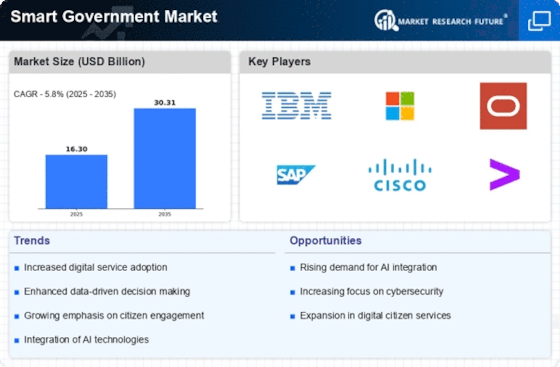Market Share
Smart Government Market Share Analysis
Smart Government market has experienced remarkable trends and transformations over the last few years indicating a global shift towards digitization and technology integration in public administration. Consequently, Smart Government market is transforming public sector landscape by reshaping it since all governments globally struggle to improve efficiency, transparency, citizen involvement etc.
The increasing acceptance of cloud-based solutions is a leading trend in the Smart Government market. Governments are acknowledging that scalability, accessibility, and cost-effectiveness benefits can be realized through cloud computing. Cloud-based smart government applications enable uninterrupted data sharing, real-time collaboration as well as enhanced flexibility in the delivery of public services. This aligns with the wider digital transformation trend where governments want to modernise their infrastructure through leveraging on cloud technology.
Another significant development is that more and more governments employing data analytics and artificial intelligence (AI) in their Smart Government systems. The potential for big data analytics to extract useful insights from large amounts of data has been tapped by governments. Machine learning and natural language processing are AI technologies used to automate routine tasks, enhance decision-making processes and offer predictive analytics for better allocation of resources. This helps shape smarter governance by combining information analysis and AI techniques in making policies that are made for better provision of public services. Smart Governance market evolution is being driven by citizen-centric initiatives across various countries globally. Governments focus on improving citizens’ experience by establishing user-friendly interfaces, mobile applications among other personalized services. Citizen feedback integration alongside participatory platforms promotes higher inclusivity as well as accountability regarding decision-making operations. These trends show a move towards a more responsible approach towards implementing smart governance geared towards citizens’ satisfaction. Additionally, the global push towards sustainability and environmental consciousness is impacting the Smart Government market. The government seeks to establish intelligent cities that are environmentally friendly and save energy through application of smart technologies. Smart cities encompassing intelligent transportation systems, energy management, and waste reduction are becoming more popular as governments strive to create resilient and sustainable communities.



















Leave a Comment